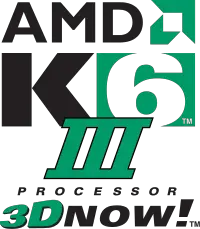(→Architecture) |
|||
| Line 44: | Line 44: | ||
== Architecture == | == Architecture == | ||
| − | {{main|amd/ | + | {{main|amd/microarchitectures/k6-iii|l1=K6-III Microarchitecture}} |
{{empty section}} | {{empty section}} | ||
Revision as of 12:41, 7 September 2016
| AMD K6-III | |

| |
| K6-III marking logo | |
| Developer | AMD |
| Manufacturer | AMD |
| Type | Microprocessors |
| Introduction | October 16, 1998 (announced) February 22, 1999 (launch) |
| Architecture | IA-32 with MMX and 3DNow+ |
| ISA | IA-32 |
| µarch | K6-III |
| Word size | 32 32 bit
4 octets 8 nibbles |
| Process | 180 nm 0.18 μm , 250 nm1.8e-4 mm 0.25 μm
2.5e-4 mm |
| Technology | CMOS |
| Clock | 333 MHz-450 MHz |
| Package | CPGA-321 |
| Socket | Socket 7, Super Socket 7 |
| Succession | |
| ← | → |
| K6-2 | Athlon Duron |
K6-III was a family of 32-bit x86 microprocessors introduced by AMD in February of 1999 as a successor to the K6-2 family. K6-III was an attempt by AMD to stretch the life of the original K6 (a NexGen design) for a bit longer while they worked on K7 (Athlon).
Overview
AMD's K7 was well into development in 1998 when they announced a partnership with Motorola (now Freescale) with the goal of improving their manufacturing problems in an attempt to take on Intel. Athlon was to be released in mid-1999. The K6-III served as a temporary solution, introducing a number of small modification to the microarchitecture which resulted in a performance increase. The significant increase in performance is a result of a new large on-die L2$. Previously, systems incorporated an L2$ on the motherboard which ranged from 512 KB to 2MB. This changed with K6-III which added 256 KB of level 2 cache on-die. AMD branded this setup "TriLevel Cache", moving the on-motherboard cache to level 3.
As with K6-2, K6-III offers 3DNow!, MMX, and 3DNow+ which contained a number of new DSP instructions. K6-III, however, did not incorporated any new Intel MMX instructions. Like its predecessors, K6-III further extended the life of the Super 7 socket.
K6-III lived for only a few months. By June of 1999, AMD moved on to Athlon by which point K6-III lost any competitive advantage. In late 1999, Intel suffered major manufacturing issues, creating massive shortages of Pentium III processors. This created significant demand for Athlon models forcing AMD to discontinue K6-III to allocate more resources to Athlon to cope with the demand.
Architecture
- Main article: K6-III Microarchitecture
| This section is empty; you can help add the missing info by editing this page. |
Die Shot
| This section is empty; you can help add the missing info by editing this page. |
Identification
| Identification | |||||||||||||||||||||||||||||||||
| AMD- | K6-III | / | 350 | A | C | K | |||||||||||||||||||||||||||
| AMD- | K6-III | / | 433 | A | F | X | -66 | ||||||||||||||||||||||||||
Bus Speed Variant
| |||||||||||||||||||||||||||||||||
TCASE Range
| |||||||||||||||||||||||||||||||||
Core Voltage
I/O Voltage Always 3.3675 ± 7% | |||||||||||||||||||||||||||||||||
Package Designation
| |||||||||||||||||||||||||||||||||
| Frequency (MHz) | |||||||||||||||||||||||||||||||||
Type
| |||||||||||||||||||||||||||||||||
Members
| This section is empty; you can help add the missing info by editing this page. |
| designer | AMD + |
| first announced | October 16, 1998 + |
| first launched | February 22, 1999 + |
| full page name | amd/k6-iii + |
| instance of | microprocessor family + |
| instruction set architecture | IA-32 + |
| main designer | AMD + |
| manufacturer | AMD + |
| microarchitecture | K6-III + |
| name | AMD K6-III + |
| package | CPGA-321 + |
| process | 180 nm (0.18 μm, 1.8e-4 mm) + and 250 nm (0.25 μm, 2.5e-4 mm) + |
| socket | Socket 7 + and Super Socket 7 + |
| technology | CMOS + |
| word size | 32 bit (4 octets, 8 nibbles) + |